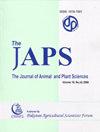EXAMINATION OF FERTILITY INDICATORS OF EUROPEAN BROWN HARES (Lepus europaeus) IN EASTERN HUNGARY
IF 0.5
4区 生物学
Q3 AGRICULTURE, MULTIDISCIPLINARY
引用次数: 0
Abstract
A decreasing tendency in the populations of the European brown hare can be observed in the whole of Europe from the mid-1960s to the present day. Among the reasons for declining populations fertility indicators of females are also mentioned. The aim of our study was to determine the reproductive parameters of the species in eastern Hungary. During the years 2015-2016, we studied two hundred animals (121♀, 79♂). Altogether, 121 uteri (81 adult and 40 juvenile) and 79 testicles were examined. The number of placental scars showed us the number of offspring in reproductive periods. The age of hares was estimated based on the weight of dried eye lens. The number of placental scars in the general linear model was significantly affected by hunting areas, the age of animals, the interaction of the former two, and also by body weight and kidney fat indices. The age of hares, the hunting year, the effect of the interaction of the former two, and body weight seriously contributed to the weight of the testicles. Based on the number of placental scars, 70.37% of adult and 62.50% of juvenile females were proved to be capable of reproduction. One can conclude from the above that although fertility indicators may play an important role in the decreasing trend in the numbers of Hungarian brown hare populations, they are definitely not the main causes.匈牙利东部欧洲褐兔(Lepus europaeus)生育指标的研究
从20世纪60年代中期到现在,在整个欧洲可以观察到欧洲褐兔种群数量的下降趋势。在人口下降的原因中,还提到了女性生育指标。我们研究的目的是确定该物种在匈牙利东部的生殖参数。在2015-2016年间,我们研究了200只动物(121只母,79只公)。总共检查了121个子宫(81个成人和40个青少年)和79个睾丸。胎盘疤痕的数量向我们展示了生殖期后代的数量。根据干晶状体的重量来估计兔子的年龄。在一般线性模型中,胎盘疤痕数量受狩猎区域、动物年龄、动物年龄与动物年龄的交互作用以及体重和肾脂指数的显著影响。野兔的年龄、狩猎年份、前两者的相互作用和体重的影响,严重影响了睾丸的重量。根据胎盘瘢痕数,70.37%的成虫和62.50%的雌虫具有繁殖能力。从以上可以得出结论,虽然生育指标可能在匈牙利褐兔种群数量减少的趋势中发挥重要作用,但它们绝对不是主要原因。
本文章由计算机程序翻译,如有差异,请以英文原文为准。
求助全文
约1分钟内获得全文
求助全文
来源期刊

Journal of Animal and Plant Sciences
Multiple-
CiteScore
1.50
自引率
0.00%
发文量
128
审稿时长
6 months
期刊介绍:
The Journal of Animal and Plant Sciences (JAPS) is a bi-monthly publication and is being published regularly since 1991 by the Pakistan Agricultural Scientists Forum (PAS FORUM). It publishes original research papers, review, extension/clinical articles on all aspects of animal (including fisheries/wildlife) and plant sciences, agricultural economics, rural sociology and other related subjects. The journal is read, abstracted and indexed by the abstracting/indexing agencies of international repute.
 求助内容:
求助内容: 应助结果提醒方式:
应助结果提醒方式:


